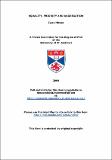Equality, priority, and aggregation
Abstract
In this dissertation, I discuss two distributive principles in moral philosophy:
Derek Parfit's Prioritarianism and Egalitarianism. I attempt to defend
a version of Egalitarianism, which I call Weighted Egalitarianism. Although
Parfit claims that Egalitarianism is subject to what he calls the Levelling
Down Objection, I show (a) that my proposed Weighted Egalitarianism is
not subject to the Objection, and (b) that it gives priority to the worse
off people. The real difference between the two principles lies in how the
weight of each person's well-being is determined. Prioritarianism assumes
that there is a moral scale of the goodness of well-being, independently of
distributions of people's well-being. I raise two objections to this claim:
firstly, it is hard to believe that the choice of the level of well-being affects
our distributive judgement; secondly, it is hard to believe that there is such
a moral scale independently of distributions of people's well-being. On the
other hand, Weighted Egalitarianism claims that the weight is given by the
rank order position of the person in the ranking by well-being level. This
means that, in Weighted Egalitarianism, the goodness of a distribution is
an increasing, linear function of people's well-being. Weighted Egalitarianism
is not affected by the choice of the level of people's well-being. Nor
does it require require the moral scale of the goodness of well-being independently
of distributions of people's well-being. Leximin, which might be
a version of Prioritarianism, avoids my objections. But it is hard to support
Leximin, because it rules out the trade off between the better off and the
worse off. I conclude that Weighted Egalitarianism is more acceptable than
Prioritarianism.
Type
Thesis, PhD Doctor of Philosophy
Collections
Items in the St Andrews Research Repository are protected by copyright, with all rights reserved, unless otherwise indicated.

